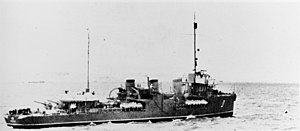Zheleznyakov was one of eight Fidonisy-class destroyers built for the Imperial Russian Navy during World War I. She was originally named Korfu (Корфу) before she was renamed Petrovsky (Петровский) in 1925 and Zheleznyakov (Железняков) in 1939 after anarchist Anatoli Zhelezniakov.
 Zheleznyakov, 1946
| |
| History | |
|---|---|
| Name | Korfu (Корфу) |
| Namesake | Siege of Corfu |
| Builder | Naval Shipyard, Nikolayev |
| Laid down | 23 May 1916 |
| Launched | 10 October 1917 |
| Fate | Captured by Germany, Ukrainian People's Army, and Red Army |
| Name | Korfu |
| Namesake | Anatoli Zhelezniakov |
| Acquired | 1920 |
| Commissioned | 10 June 1925 |
| Renamed |
|
| Fate | Transferred to Bulgarian Navy, 1947 |
| Name | Zheleznyakov |
| Acquired | 18 December 1947 |
| Fate | Returned to the Soviet Navy, 15 September 1949 |
| Acquired | 15 September 1949 |
| Renamed | PKZ-62 (ПКЗ-62), 8 April 1953 |
| Reclassified | As barracks ship, 8 April 1953 |
| Stricken | 10 July 1956 |
| Fate | Scrapped, 1957 |
| General characteristics | |
| Class and type | Fidonisy-class destroyer |
| Displacement | |
| Length | 93.26 m (306 ft 0 in) |
| Beam | 9.05 m (29 ft 8 in) |
| Draft | 3.2 m (10 ft 6 in) |
| Installed power |
|
| Propulsion | 2 shafts; 2 steam turbines |
| Speed | 33 knots (61 km/h; 38 mph) |
| Range | 1,450 nmi (2,690 km; 1,670 mi) at 16 knots (30 km/h; 18 mph) |
| Complement | 136 |
| Armament |
|
Design and description
editThe Fidonisy-class ships were designed as an improved version of the Derzky class with an additional 102-millimeter (4 in) gun. Korfu displaced 1,326 long tons (1,347 t) normal and 1,580 long tons (1,610 t) at full load with an overall length of 92.51 meters (303 ft 6 in), a beam of 9.05 meters (29 ft 8 in), and a draft of 3.2 meters (10 ft 6 in) at full load.[1] She was propelled by two Parsons steam turbines, each driving one propeller, designed to produce a total of 29,000 shaft horsepower (22,000 kW) using steam from five 3-drum Thorneycroft boilers for an intended maximum speed of 33 knots (61 km/h; 38 mph). During her sea trials, the ship reached a speed of 30.9 knots (57.2 km/h; 35.6 mph). Korfu carried enough fuel oil to give her a range of 2,050 nautical miles (3,800 km; 2,360 mi) at 19 knots (35 km/h; 22 mph). Her crew numbered 136.[2][3]
The Fidonisy-class ships mounted a main armament of four single 102 mm Pattern 1911 Obukhov guns, one on the forecastle and three aft; one of these latter guns was superfiring over the other two. Anti-aircraft defense for Korfu and her sisters that were completed after the war was provided by a single 76.2-millimeter (3 in) Lender gun on the stern, a 37-millimeter (1.5 in) Maxim cannon, and four 7.62-millimeter (0.3 in) M-1 machine guns. The destroyers mounted four triple 450-millimeter (17.7 in) torpedo tube mounts amidships with two reload torpedoes and could carry 80 M1908 naval mines. They were also fitted with a Barr and Stroud rangefinder and two 60-centimeter (24 in) searchlights.[2]
References
editBibliography
edit- Apalkov, Yu. V. (1996). Боевые корабли Русского флота 8.1914-10.1917 гг. Справочник [Directory of Russian Navy Warships, August 1914–October 1917] (in Russian). St. Petersburg: Intek. ISBN 5-7559-0018-3.
- Berezhnoy, Sergey (2002). Крейсера и миноносцы. Справочник [Guide to Cruisers and Destroyers] (in Russian). Moscow: Voenizdat. ISBN 5-203-01780-8.
- Breyer, Siegfried (1992). Soviet Warship Development: Volume 1: 1917–1937. London: Conway Maritime Press. ISBN 0-85177-604-3.
- Chernyshev, Alexander (2011). Русские суперэсминцы. Легендарные "Новики" [Russian Superdestroyers: Legendary Noviks] (in Russian) (2nd ed.). Moscow: Yauza/Eksmo. ISBN 978-5-699-53144-8.
- Hill, Alexander (2018). Soviet Destroyers of World War II. New Vanguard. Vol. 256. Oxford, UK: Osprey Publishing. ISBN 978-1-4728-2256-7.
- Platonov, Andrey V. (2002). Энциклопедия советских надводных кораблей 1941–1945 [Encyclopedia of Soviet Surface Ships 1941–1945] (in Russian). Saint Petersburg: Poligon. ISBN 5-89173-178-9.
- Verstyuk, Anatoly & Gordeyev, Stanislav (2006). Корабли Минных дивизий. От "Новика" до "Гогланда" [Torpedo Division Ships: From Novik to Gogland] (in Russian). Moscow: Voennaya Kniga. ISBN 5-902863-10-4.
Further reading
edit- Budzbon, Przemysław (1985). "Russia". In Gray, Randal (ed.). Conway's All the World's Fighting Ships 1906–1921. Annapolis, Maryland: Naval Institute Press. pp. 291–325. ISBN 0-85177-245-5.
- Budzbon, Przemysław (1980). "Soviet Union". In Chesneau, Roger (ed.). Conway's All the World's Fighting Ships 1922–1946. Greenwich, UK: Conway Maritime Press. pp. 318–346. ISBN 0-85177-146-7.
- Budzbon, Przemysław; Radziemski, Jan & Twardowski, Marek (2022). Warships of the Soviet Fleets 1939–1945. Vol. I: Major Combatants. Annapolis, Maryland: Naval Institute Press. ISBN 978-1-68247-877-6.
- Likachev, Pavel Vladimirovich (2005). Эскадренные миноносцы типа "Новик" в ВМФ СССР 1920-1955 гг [Novik-class Destroyers in the Soviet Navy 1920-1955] (in Russian). Samara, Russia: ISTFLOT. ISBN 978-5-98830-009-0.
- Rohwer, Jürgen (2005). Chronology of the War at Sea 1939–1945: The Naval History of World War Two (Third Revised ed.). Annapolis, Maryland: Naval Institute Press. ISBN 978-1-59114-119-8.
- Watts, Anthony J. (1990). The Imperial Russian Navy. London: Arms and Armour. ISBN 978-0-85368-912-6.
- Whitley, M. J. (1988). Destroyers of World War Two: An International Encyclopedia. Annapolis, Maryland: Naval Institute Press. ISBN 978-0-87021-326-7.